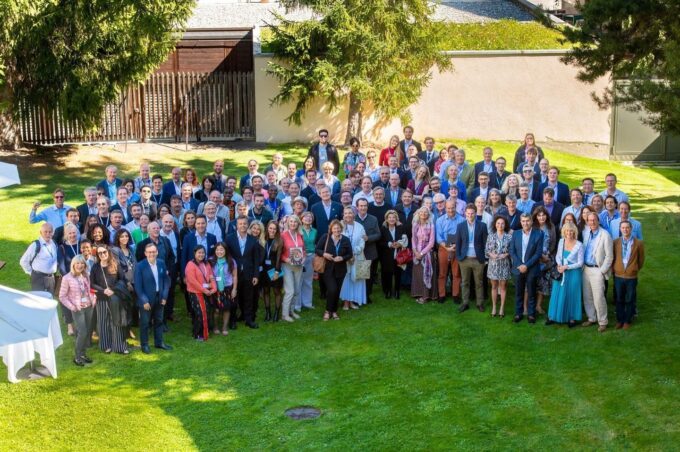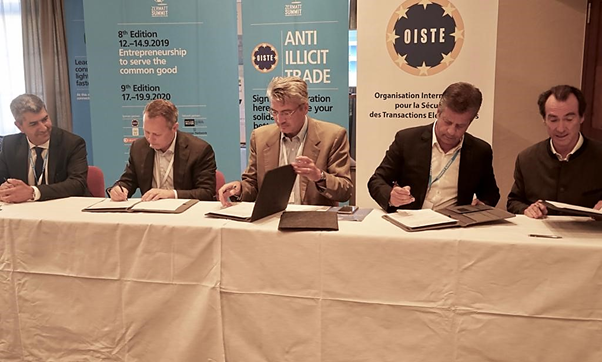Zermatt Summit against illegal trade
At the Zermatt Summit, the OISTE Foundation, together with the Zermatt Summit Foundation, made a big statement: The Anti-Illicit Trade Declaration calls on the international community to stand up against all forms of illegal trade. The main points have already been endorsed by various leading corporations.

The Zermatt Summit has been held under the Matterhorn since 2010. The conference is primarily intended for business / financial leaders and entrepreneurs in an action-oriented dialogue with decision-makers from civil society, science, education, even spirituality and the public sector.
According to the organizers, the annual conference program of the Zermatt Summit is a catalyst to inspire, share innovations and put new business development models into action, prioritizing human dignity in our globalized world.
Anti-Illicit Trade Declaration signed
The OISTE Foundation and the Zermatt Summit Foundation, together with Sucafina, Integral Petroleum, Philip Morris International and delegates from 46 different countries, have signed the Anti-Illicit Trade Declaration launched in Zermatt back in 2018. This is intended to call on the international community to address all forms of illicit trade.
This is because, despite significant efforts by global organisations, governments and private sector activists, illicit trade remains widespread and poses a significant threat to the global economy.
Illegal trade as a cause of wealth inequality
The Declaration on Combating Illicit Trafficking outlines the steps that need to be taken to stop illicit trafficking. Governments and private sector signatories agree that it must be treated as a serious crime.
Today, with the digitalization of economies and recent technological developments, the fundamentals of trade are changing in both legal and illicit economies. Improved global networks, real-time data exchange systems and online platforms are enabling a more efficient supply of illicit products and increasing the number of parties involved in this market.
This poses significant challenges to legitimate manufacturers, governments and other operators in the affected industries.
As a result, illicit trade has created significant wealth disparities between developing and developed countries, fueling devastating conflicts and undermining countries' legitimacy. Indeed, illicit trade is the conduit that enables destabilization and dangerous activities in almost all sectors of the global economy. As a result, new forms of illicit trade have emerged, making the fight against illicit trade more complex and transnational than ever before.
More and more goods affected
Illegal trade impedes the basic building blocks for development, democracy, human rights and the rule of law. It enables corrupt practices among government officials and private individuals. Every year, more and more goods and brands in all sectors are also affected by illicit trade.
There is therefore an urgent need to develop a declaration to combat illicit trafficking in order to raise awareness of the problem and respond to these challenges.
The OISTE Foundation and the Zermatt Summit, with a high-level international expert group, therefore launched the Anti-Illicit Trade Declaration at the Zermatt Summit in September 2018. The Declaration was presented to the international community as part of a global roadshow calling on the international community to address all forms of illicit trade, promote due diligence and supply chain control, and encourage collaboration between state and non-state actors in developing sustainable solutions.
The main principles of the Anti-Illicit Trade Declaration
- treat illicit trafficking as a serious crime under the United Nations Convention against Transnational Organised Crime (UNCAT), the United Nations Convention against Corruption (UNCAC) and the Agreement on Trade-Related Aspects of Intellectual Property Rights (TRIPS),
- Tackle the problems of corruption and money laundering related to illicit trafficking in legislation.
- a zero-tolerance policy;
- Strengthen the legal framework and support law enforcement;
- Improve inter-agency mechanisms to combat illicit trafficking crime;
- Support governments that destroy illegal trade products;
- Pressure governments and other entities that use or facilitate the use of products derived from illicit trade;
- put criminal entrepreneurs out of business;
- Reduce incentives to enter illegal markets;
- Reduce the ability of organised crime to penetrate the financial system;
- Help governments maintain legitimate markets and promote the United Nations Sustainable Development Goals (UN SDGs).
Illegal trade has a negative impact on economic stability, social well-being, public health, public safety and our environment. There are numerous documented examples of this.
Further information: http://www.oiste.org and http://www.zermattsummit.org










